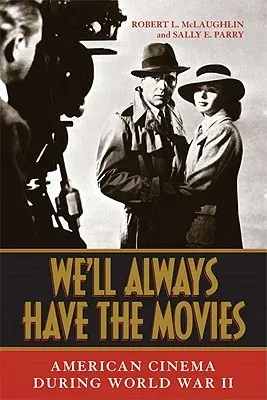We'll Always Have the Movies explores how movies made in Hollywood
during World War II were vehicles for helping Americans understand the
war. Far from being simplistic, flag-waving propaganda designed to evoke
emotional reactions, these films offered audiences narrative structures
that formed a foundation for grasping the nuances of war. These films
asked audiences to consider the implications of the Nazi threat, they
put a face on both our enemies and allies, and they explored changing
wartime gender roles. We'll Always Have the Movies reveals how film
after film repeated the narratives, character types, and rhetoric that
made the war and each American's role in it comprehensible.
Robert L. McLaughlin and Sally E. Parry have screened more than 600
movies made between 1937 and 1946 -- including many never before
discussed in this context -- and have analyzed the cultural and
historical importance of these films in explaining the war to
moviegoers. Pre-Pearl Harbor films such as Sergeant York, Foreign
Correspondent, and The Great Dictator established the rationale for
the war in Europe. After the United States entered the war, films such
as Air Force, So Proudly We Hail! and Back to Bataan conveyed
reasons for U.S. involvement in the Pacific. The Hitler Gang,
Sahara, and Bataan defined our enemies; and Mrs. Miniver, Mission
to Moscow, and Dragon Seed defined our allies. Some movies -- The
Miracle of Morgan's Creek, Hail the Conquering Hero, and Lifeboat
among them -- explored homefront anxieties about the war's effects on
American society.
Of the many films that sought to explain the politics behind and the
social impact of the war -- and why it concerned Americans --
Casablanca is perhaps one of the most widely recognized. McLaughlin
and Parry argue that Rick's Café Américain serves as a United Nations,
sheltering characters who represent countries being oppressed by
Germany. At Rick's, these characters learn that they share a common love
of freedom, which is embodied in patriotism; from this commonality, they
overcome their differences and work together to solve a conflict that
affects them all. As the representative American, Rick Blain (Humphrey
Bogart) cannot idly stand by in the face of injustice, and he ultimately
sides with those being oppressed. Bogart's character is a metaphor for
America, which could also come out of its isolationism to be a true
world leader and unite with its allies to defeat a common enemy.
Collectively, Hollywood's war-era films created a mythic history of the
war that, even today, has more currency than the actual events of World
War II.

